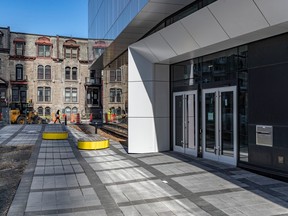The size of the increase, however, will differ widely from borough to borough.

Non-residential property taxes in Montreal will rise by an average of 1.9 per cent next year, the City of Montreal announced in its annual budget Wednesday, the smallest increase since 2022.
The size of the increase, however, will differ widely from borough to borough. Businesses in the downtown Ville-Marie borough will see taxes decline an average of 3.1 per cent while businesses in Lachine will pay an average of 9.6 per cent more next year, making that the highest average increase in the city.
City officials say the difference comes down to the fact that the value of commercial buildings downtown is rising at a slower pace than the value of commercial and industrial buildings in other parts of the city.
Non-residential property taxes are going up at a slower rate than residential property taxes, which are set to rise by an average of 2.2 per cent when borough taxes are included, which the city says is part of a deliberate effort to reduce the gap between non-residential property taxes and residential property taxes.
In 2024, the gap between non-residential property tax rates and residential property tax rates in Montreal was the highest in the country, according to an analysis of rates in 11 major cities by real estate advisory company Altus Group. The study found that tax rates on non-residential properties in Montreal were an average of 4.46 times higher than residential properties.
Of the cities analyzed in that report, only Vancouver and Calgary had lower residential property taxes than Montreal, though Montreal had higher taxes on non-residential properties than any of the 11 cities except Quebec City, Halifax and, for some types of property, Ottawa.
The city said it is maintaining a lower tax rate on the first $900,000 of value of non-residential buildings, which will save qualifying building owners 16 per cent on their property tax. Some 70 per cent of non-residential buildings in the city are worth $900,000 or less and 90 per cent of buildings are eligible for the measure. The owner of a building valued at $900,000 is expected to save more than $4,000 in property taxes this year.
While the non-residential property tax increase is lower than the increases in 2024 and 2023, it is fourth-highest increase since 2016, before which non-residential taxes generally rose faster than residential property taxes.
Other measures intended to boost business include an additional $10 million for downtown Montreal, including $4 million for cleanliness.
Using data from the Conference Board of Canada, the city estimated that Montreal’s gross domestic product will grow by 0.5 per cent this year, below the 1.1 per cent estimated for both Quebec and Canada. Next year, it is forecasting GDP growth of 2.2 per cent, above a 1.5 per cent growth forecast for the province and a 1.7 per cent growth estimate for Canada.
Unemployment in Montreal is expected to stay relatively stable — at six per cent next year — below the 6.7 per cent forecast for the entire country.
Vacancy rates for retail stores are dropping, according to the budget, a trend expected to continue in the coming months, even while retail rent continue to rise.
Companies are still shedding office space because of the rise of teleworking, the city said, but the trend is slowing and many downtown office building owners are renovating in an effort to attract tenants.